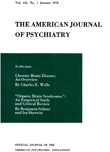What is Competency to Stand Trial?
Abstract
Problems involved in determining a defendant's competency to stand trial are often an outgrowth of confused evaluations. A possible remedy exists in setting up evaluation criteria relevant to the legal situation and to the definition of competency. These should focus on information about the defendant's understanding of his predicament, the defendant's future behavior, and the client-lawyer relationship. The authors conclude that an adequate competency examination focuses on defendant and lawyer together.
Access content
To read the fulltext, please use one of the options below to sign in or purchase access.- Personal login
- Institutional Login
- Sign in via OpenAthens
- Register for access
-
Please login/register if you wish to pair your device and check access availability.
Not a subscriber?
PsychiatryOnline subscription options offer access to the DSM-5 library, books, journals, CME, and patient resources. This all-in-one virtual library provides psychiatrists and mental health professionals with key resources for diagnosis, treatment, research, and professional development.
Need more help? PsychiatryOnline Customer Service may be reached by emailing [email protected] or by calling 800-368-5777 (in the U.S.) or 703-907-7322 (outside the U.S.).



